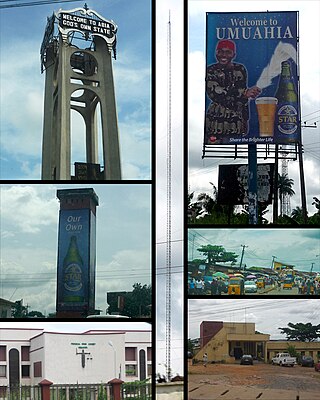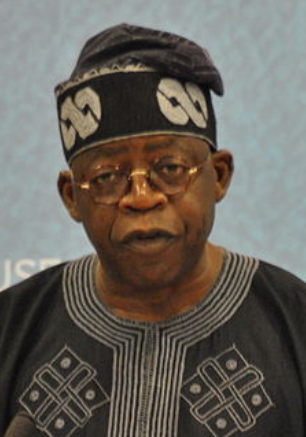Related Research Articles
The Anaang are an ethnic group in southern Nigeria, whose land is primarily within 8 of the present 31 local government areas in Akwa Ibom State: Abak, Essien Udim, Etim Ekpo, Ika, Ikot Ekpene, Obot Akara, Oruk Anam, Ukanafun in Akwa Ibom State. The Anaang are the second largest ethnic group in Akwa Ibom state.
Augustine Ukattah was a Nigerian teacher and politician.

Umuahia is the capital city of Abia State in southeastern Nigeria. Umuahia is located along the rail road that lies between Port Harcourt to its south,and Enugu city to its north. Umuahia has a population of 359,230 according to the 2006 Nigerian census. Umuahia is indigenously Igbo.

The Aba Women's Riots of 1929 was a period of unrest in colonial Nigeria over November 1929. The protests broke out when thousands of Igbo women from the Bende District, Umuahia and other places in southeastern Nigeria traveled to the town of Oloko to protest against the Warrant Chiefs, whom they accused of restricting the role of women in the government. The protest encompassed women from six ethnic groups.

Nigeria has 774 local government areas (LGAs), each administered by a local government council consisting of a chairman, who is the chief executive, and other elected members, who are referred to as councillors. Each LGA is further subdivided into a minimum of ten and a maximum of twenty wards. A ward is administered to by a councillor, who reports directly to the LGA chairman. The councillors fall under the legislative arm of the local government, the third tier of government in Nigeria, below the state governments and the federal government.

Obot-Akara is in the south of Nigeria and is a Local Government Area of Akwa Ibom State.
Ikwuano is a Local Government Area of Abia State, Nigeria. Its headquarters is in Isiala Oboro. The name 'Ikwuano' etymologically indicates that there are four different ancient kingdoms that make up the community called Ikwuano. These include Oboro, Ibere, Ariam/Usaka and Oloko.
Ngwa people, an Igbo group in south eastern part of Nigeria. It's also the largest and most populous ethnic group in Abia state southeastern Nigeria. They occupy an area of about 1,328 square kilometres (513 sq mi), although some accounts read at least 2,300 km2. The current population is estimated to be 3 million. Within the seventeen local government areas of Abia State, Nigeria. Ngwa people occupy nine Local Government Areas which include: Aba North, Aba South, Isiala Ngwa North, Isiala Ngwa South, Obi Ngwa, Osisioma, Ugwunagbo, Ukwa East, Ukwa West. The Ngwa language spoken by more than 3.5million people in Aba North, Aba South, Osisioma, Obingwa, Ugwunagbo, Isiala Ngwa North and Isiala Ngwa South LGA's and in Rivers State,Opobo and Bonny Island people are also speaking Ngwa dialect and Ngwa unique alphabets are endangered as there is no official documentation and parts of the artificial "Central Igbo" dialect are being substituted into Ngwa language by the younger generation.
Odumodu is a folk style of music that is predominantly sung among the Arochukwu, Bende, Ohafia, Abiriba, Umuahia, Ikwuano, and Ngwa people of the Igbo ethnic group, of Abia State, located in southeastern Nigeria. It is mainly used to uplift spirits and entertain guests at events, while extolling the virtues of illustrious men and women, and telling stories that edify.
Nwanyeruwa, also known as Madame Nwanyeruwa, was an Igbo woman living in colonial Nigeria who gained prominence for her role in the Aba Women's Riots, better known as the Women's War. The revolt stemmed for the reluctance of Nigerian women to be taxed amidst the economic hardships of the Great Depression. After a scuffle with a male Igbo Warrant Officer, Nwanyeruwa organized 10,000 Nigerian woman in a protest against the colonial and native authorities. While the protest did not result in much concrete changes or acceptance of Nwanyeruwa's demands, it did result in woman being involved in the colonial Nigerian political system. Nwanyeruwa's actions have been appraised by several historians, who cite her actions as an important milestone in the history of African nationalism.
Oboro is the largest of four clans in Ikwuano Local Government Area of Abia State, Nigeria. It is bounded to the north by Ibeku and Bende clans, west by the Olokoro and Ngwa, east by Ibere and south by the Isuogu. Oboro was classified in the Ohuhu-Ngwa cluster of the Southern Igbo area by British anthropologists Forde and Jones. It is also one of 18 Igbo clans in the Old Bende Division of the defunct Owerri Province. The Oboro speak a common language with the other 17 clans of the Bende Division though dialectal variations exist. These clans share a history of inter-ethnic relations.
Ibere is a clan located in the eastern part of Ikwuano Local Government Area, Abia State, Nigeria. It borders Oboro to the west, Bende to the north, the Isuogu to the south, Itumbauzo and Nkari to the east. It is one of 18 Igbo clans of the Old Bende Division. Ibere was classified in the Ohuhu-Ngwa cluster of the Southern Igbo area by Forde and Jones.

The 2023 Nigerian presidential election in Abia State will be held on 25 February 2023 as part of the nationwide 2023 Nigerian presidential election to elect the president and vice president of Nigeria. Other federal elections, including elections to the House of Representatives and the Senate, will also be held on the same date while state elections will be held two weeks afterward on 11 March.
Nnono is a village in Oboro, Ikwuano Local Government Area in Abia State, Nigeria. Nnono has common boundaries with Amaoba, Umugbalu, Ndoro, Ahuwa, Olokoro and Ngwa. Nnono consists of two autonomous communities and six sub-villages.
Ariam/Usaka is one of the four principal clans of Ikwuano Local Government Area, Abia State, Nigeria. Ariam/Usaka belongs to the Isuogu family. Ariam itself is made up of three subgroups namely; Ariam, Ekpiri and Usaka. This clan borders Ibere and Oboro to the north, Oloko to the west, as well as several Ibibio communities in Akwa Ibom State to its eastern and southern borders. Forde and Jones categorized the Isuogu family in the Ohuhu-Ngwa cluster of the Southern Igbo area.
Ahaba is a rural community in Oloko, Ikwuano Local Government Area of Abia State, Nigeria. Isiala Ahaba and Ahaba Ukwu are the autonomous communities of Ahaba. Ahaba is 23km south of Umuahia, Abia State's capital city.
Nchara is an agrarian community in Oloko, Ikwuano Local Government Area, Abia State, Nigeria. It is composed of two sister villages namely; Akanu and Etoruo. Afa Ukwu is the autonomous community of Nchara. It is about 24 km away from the state capital, Umuahia.
Ariam Ala-Ala is a village in Ikwuano Local Government Area of Abia State, Nigeria. It is one of 15 localities of the Ariam/Usaka clan. The community is located along the Umuahia-Ikot Ekpene Road and is about 27 km away from the state capital, Umuahia.
Itunta is a village in Ibere, Ikwuano Local Government Area, Abia State, Nigeria. Itunta falls under the Umuakoo Autonomous Community. The Eze of Umuakoo is HRM Eze Monday Unadindu Okoro in whom is conferred with the title of Akoo II of Umuakoo. Itunta is renowned for her vast cocoa production.
Ogbuebulle is a village in Oboro, Ikwuano Local Government Area, Abia State, Nigeria. The community is situated along the Umuahia-Ikot Ekpene Road. It is about 20km away from Umuahia, the capital of Abia State. Ogbuebulle is part of the Ala-Ala Oboro Autonomous Community alongside Ekebedi, its neighboring village.
References
- ↑ ""Igwe bu ike." ("In unity there is strength.") – Enyia Strategies" . Retrieved 2023-01-18.
- ↑ "Akobundu's day out in the Ikwuano sun". TheCable. 2022-01-05. Retrieved 2023-01-18.
- 1 2 Chiedozie, Dr; Atuonwu, Chiedozie. "ORIGIN, MIGRATION AND SETTLEMENT IN PRE-COLONIAL OLD BENDE DIVISION OF SOUTHEASTERN NIGERA". ResearchGate . Retrieved 15 September 2023.
- ↑ Forde, Daryll; Jones, G. I. (2017). The Ibo and Ibibio-Speaking Peoples of South-Eastern Nigeria. doi:10.4324/9781315297736. ISBN 9781315297736.
- ↑ "Bring more Development to Rural Areas -Traditional Ruler tells Gov Ikpeazu". National Ambassador. Retrieved 2023-01-19.
- ↑ Glover, Jonathan (1995). Women, Culture and development: A study of human capabilities . Oxford University. pp. 449.
- ↑ Oriji, John N. (2000). Igbo Women From 1929-1960. West Africa Review: 2, 1.